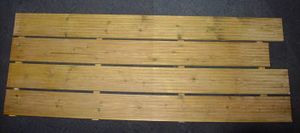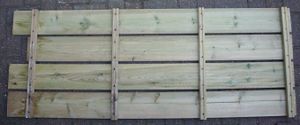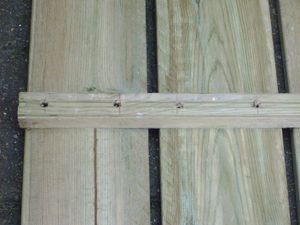Duckboard
There are 3 types of duckboard:
1. Slatted timber flooring for use in wet, muddy or cold conditions. Duckboards provide a well drained surface that sheds dust & dirt, and are mainly used in bathing areas. Wood also has a degree of natural antibacterial & antifungal effect, reducing the spread of foot infections.
2. Another style of duckboard is used for roofing, consisting of timber crosspieces nailed to a plank. These are climbable and spread load, and are also called cat ladders. Sometimes 2 of these are attached and slung over the ridge.
3. Open ribbed PVC matting is a flexible safety matting with a miniature duckboard style structure. Its mainly used in industry.
Why duckboard?
- Never stand in a wet puddle again when you get out of the shower
- Stand on flooring that stays a lot cleaner than its surroundings
- Duckboard flooring can be taken outside and rinsed or pressure washed
- Practical floorcovering for £1.25 a square foot (Wickes 2009), and with no need for a floorcovering underneath it cuts costs
- Works well with damp floors, allowing evaporation
- Basic duckboard is more practical than pretty. Decorative patterning is discussed further down.
Types
Traditional duckboard
This consists of many narrow wooden slats spaced apart to allow free drainage, mounted on cross pieces underneath to hold it all together. The slats have rounded top edges for comfort. These have long been used for bathers indoors and out.
Decking meets duckboard
The use of grooved decking timber makes a quicker and more robust modern version of duckboarding. The construction is different to exterior decking, but the top surface is the same.
- much quicker to construct
- timber already treated
- more robust than traditional duckboard
- heavier, and unlikely to get knocked out of position
- closed grooves drain satisfactorily but require cleaning more often than traditional open duckboard
Material
Softwood indoors in a dry house should last decades, assuming it gets a chance to dry out daily.
Durable timber species such as oak heartwood can last indefinitely. However for the average bathroom its not normally worth the extra cost. (Use the right fixings with oak to avoid staining.)
Plastic duckboard is available ready made, and is completely waterproof. But it tends to be either:
- lightweight domestic duty, and too small to be very useful
- or heavy duty for farm & factory use, with a 3 figure price to match
Construction
Decking-meets-duckboard
The top planks are standard decking board available from any DIY shed or builder's merchant.
The underside cross pieces are simply ripped down pieces of deckboard. This is close grained & treated, and can be cut from the decking offcuts. Its mounted upside down so that
- a treated surface will be in contact with the floor
- the groove makes the screw heads recessed, minimising corrosion
- and eliminating any risk of a screwhead scratching the floor below.
The underneath cross pieces can sometimes rot eventually, usually well before the top deck. If screwed in place rather than glued they can be replaced in minutes.
Pilot & clearance holes minimise the chance of splitting the timber, some of which is small (split wood is much more vulnerable to rot). Drywall screws have a thin shank, increasing the amount of lateral movement available to the wood, and making drilling and driving quicker. (If eventual rust staining of the floor could be a problem, stainless screws can be used.) The clearance holes should be made wider than the screw shanks to allow a little natural movement of the wood without problem.
For the same reason the screws should be done up just enough and not tightened up. A quick way to do this is drive them home then undo half a turn.
Decoration
The usual way to make duckboard decorative is to divide the area into sections, with each section having boards laid at different angles. Hexagonal patterns are mildly pretty, but your imagination is the limit.


